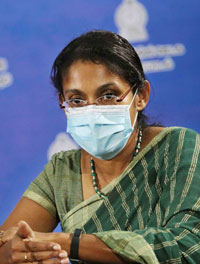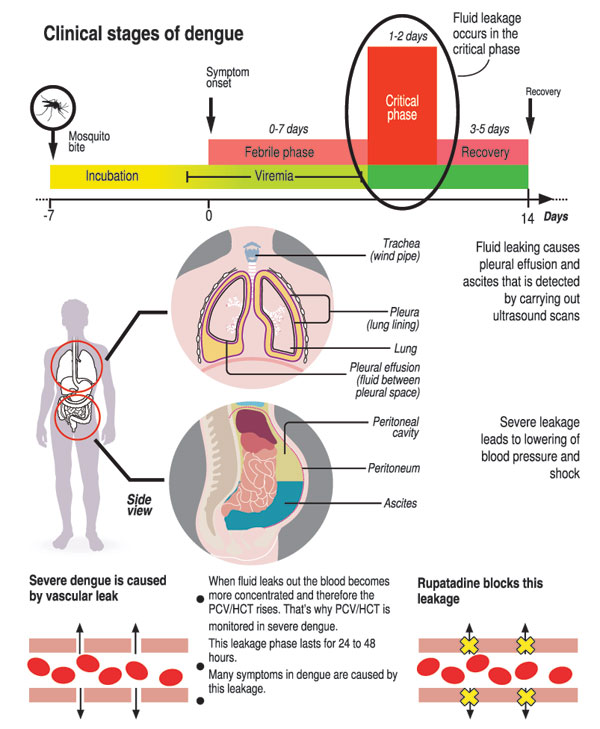News
The promise of rupatadine against severe dengue

Prof. Neelika Malavige
A ‘promising’ breakthrough in the treatment of feared dengue comes from Prof. Neelika Malavige and her team at the University of Sri Jayewardenepura, as Sri Lanka experiences a surge of cases.
The breakthrough revolves around rupatadine, an anti-histamine (a drug used against allergies), which also blocks the receptor of the Platelet-activating Factor (PAF).
It was in 2018-2019 that Prof. Malavige, Head of the Department of Immunology and Molecular Medicine, University of Sri Jayewardenepura, along with her team conducted the second clinical trial on rupatadine at the National Institute of Infectious Diseases (NIID, commonly known as IDH), Angoda.
The first study, meanwhile, conducted in 2015 and 2016 also at the NIID had given a clear pointer in the direction of rupatadine.
Is rupatadine which comes in the form of a pill, safe to be given to patients with dengue and is there a trend towards reducing severe dengue? This was what the initial study looked at, explains Prof. Malavige.
Focusing on Dengue Fever, she says that what makes this mosquito-borne viral disease deadly is when men, women or children affected by this illness descend into severe dengue or Dengue Haemorrhagic Fever (DHF).
Prof. Malavige says that during the critical phase of DHF, there is fluid leakage – the flowing of fluid from the capillaries (the smallest blood vessels in a person’s vascular system). This leakage results in fluid collection where it should not be – between the linings of the lung as pleural effusions and also in the abdomen. Such leakage makes a person’s blood pressure drop and sends that person into Dengue Shock Syndrome which also impacts on vital organs. It is vital to monitor the fluid leakage (output) during the critical phase and administer only that requirement (input), as an overload or shortage could have disastrous consequences. It cannot be ‘too much’ or ‘too little’. 
“An important cause of such vascular leakage is mediated PAF,” she says. PAF has multiple functions and apart from its action on platelets it directly increases the permeability of the vasculature, resulting in leakage.
With rupatadine playing the dual role of being an antihistamine and also acting as a PAF receptor blocker, tests on cell culture models and also mouse models by Prof. Malavige’s team, University of Oxford, United Kingdom, and Duke-NUS, Singapore, had shown a strong tendency towards preventing vascular leakage.
Having got confirmation about this oral pill’s usefulness, the team had conducted the first trial on confirmed adult dengue patients admitted to the NIID. This had been a placebo-controlled trial with 183 participants.
The findings were promising – rupatadine had the promise of reducing leakage particularly pleural effusions. Another finding was that those who had the pill (the treatment group) as against those who did not have the pill (the placebo group who got a dummy pill), had significantly less of a rise in liver enzymes and a reduced drop in the platelet count.
“There was another signal,” says Prof. Malavige, pointing out that the earlier in the course of the illness – first three days of illness – that the dengue patients took rupatadine, the benefits were more.
Thereafter, the team followed up the first study with the second, a randomized double-blind, placebo-controlled clinical trial in 2018 and 2019, not in admitted patients, but in those seeking treatment at the Outpatients Department (OPD) also of the NIID, to catch the disease early. Although the aim was to recruit 280 patients, once again adult patients as participants, the study was moving forward when the unforeseen and unexpected COVID-19 pandemic struck and the study had to end short of 31 participants.
Despite lower numbers, however, the results look promising, Prof. Malavige adds.
The team’s study titled ‘Efficay of rupatadine in reducing the incidence of DHF in patients with acute dengue: A randomized, double blind, placebo-controlled trial’ has been published on June 1 in the prestigious ‘PLOS Neglected Tropical Diseases’ journal.
The team also comprised Prof. Chandima Jeewandara, Dr. Ananda Wijewickrama, Dr. Dumni Gunasinghe, Prof. Chandanie Wanigatunga, Dr. Harsha Dissanayake, Prof. Shamini Prathapan, Dr. Eranga Narangoda and Prof. Graham Ogg from the University of Oxford.
| Very promising findings but also a strong cautionWhile detailing the promising findings of the rupatadine clinical trial, Prof. Neelika Malavige cautions people against popping the pill on their own without strict medical advice, as it cannot be considered a ‘cure’ for dengue. “Do not self-medicate and always seek medical help if dengue is suspected,” she reiterates. The findings of the study were: There were less severe symptoms in those who were given rupatadine – less headache, less vomiting and less hepatic (liver) tenderness The duration of illness was significantly less in those on rupatadine The numbers were: 17.5% of the patients who had the placebo, progressed into severe dengue (Dengue Haemorrhagic Fever – DHF) 9.7% (half the above number) who had rupatadine progressed into severe dengue. Prof. Malavige stresses that even though rupatadine seems very promising, some of those who were given this medication still developed severe dengue. It did not prevent severe dengue in all. “My personal belief is that for diseases such as dengue, like many others, what would work best is combination therapy or a cocktail of medications and not just one. Another crucial factor is proper management of dengue. This is why anyone who is ill should seek a doctor’s advice,” she adds. | |
The best way to say that you found the home of your dreams is by finding it on Hitad.lk. We have listings for apartments for sale or rent in Sri Lanka, no matter what locale you're looking for! Whether you live in Colombo, Galle, Kandy, Matara, Jaffna and more - we've got them all!

